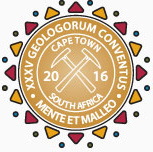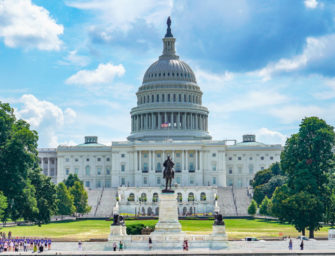Five Key Takeaways from the International Geological Congress
Sue Webb, AGU International Secretary, Brooks Hanson, Director of Publications, Frank Krause, Chief Operating Officer, and I recently had the honor of representing AGU at the 35th Annual International Geological Congress (IGC) in Cape Town, South Africa. AGU hosted the Hot Topic Lounge at IGC which featured researchers presenting on breakthrough topics throughout the week. The lounge provided attendees with another forum to hear from presenters and have a follow-up discussion to their presentations.
During our free time in South Africa, we had the chance to visit Kruger National Park for two days and see the Big Five animals: lions, leopards, buffalos, elephants, and rhinoceros. Seeing those Big Five led me to think about my personal top five takeaways from IGC as they related to AGU, so here they are:
5 Takeaways from IGC
- Talent is everywhere. We met so many talented, young researchers from Africa and other developing countries looking for opportunities to be part of, and contribute to the worldwide science enterprise. I met Dr. Musa Manzi, one of the 2016 awardees of our Africa Awards for Research Excellence in Earth and Space Science. His story of teaching physics to himself and others in his village to obtaining acceptance at WITS University is a real testament to his initiative and talent. It showed me that we, as an organization and community, need to think of more ways to support and develop the young scientific talent worldwide, especially in developing countries. How can we provide more travel support to bring these young minds to the meetings, are there other programs we can invest in? There is so much talent waited to be discovered, engaged, and supported as they seek out careers in Earth and space science.
- AGU is recognized as an international leader on ethics, professionalism, and sexual harassment issues. Before the IGC, Frank, Brooks, and I were hosted at WITS University by Sue Webb and Grant Bybee where Brooks gave two workshops. He discussed how to author research publications, ethics and professionalism in scientific research work, and presenting scientific results. We’re not the only organizations working on these issues, nor are they new but they’re now emerging more publicly. The scientific community is looking at AGU to advance, collaborate, and lead on these issues. In addition, I had the pleasure of presenting AGU’s leadership work in ethics and in addressing issues like sexual harassment in the research setting in two sessions organized by the International Association for Promoting Geoethics. The sessions were well attended and numerous participants shared their appreciation for AGU’s leadership on these topics.
- Scientists appreciate alternate discussion formats to talk about science. The popularity of the Hot Topic Lounge we hosted was proof of this. Scientists are looking for unique opportunities to discuss science in addition to attending formal lectures and oral presentation. We also facilitated an evening discussion hosted by David Baratoux, an editor of JGR Planets, on opportunities to forming a planetary science network in Africa. We expect to adapt our meetings strategy accordingly to meet the need and desire for discussion formats.
- The IGC community is broad-based and includes more than just academia. The private sector was included in many panels and sessions and provided interesting insights into their research and scholarly pursuits. They also share our challenge in addressing ethics, professionalism, and sexual harassment. We heard from people in industry and other institutions that workplace climate issues are not unique to academia; they are facing similar issues in creating safe, unbiased, non-discriminatory work environments.
- There are expanded opportunities to galvanize our community. As you know, part of AGU’s vision is to galvanize a community to advance and communicate science and its power to achieve a sustainable future. We’re a sought after partner to affiliate, engage, and create connections among scientific groups and those interested in supporting their work. We do this effectively and frequently, but there are great opportunities to reach out even further. We have scientists from all around the world come present, learn, and network with us at the Fall Meeting, or author publications with us. Are there ways we can engage these individuals more on a continual basis than an episodic basis of meeting attendance or journal authorship and connect them to others with similar interests? Our Affiliation and Engagement Task Force is tackling this issue with their final report and recommendations coming to our Council and Board this December. So stay tuned. Earth and space sciences have a global impact and there are certainly more opportunities to better support your work and the work of your colleagues.




There are no comments
Add yours